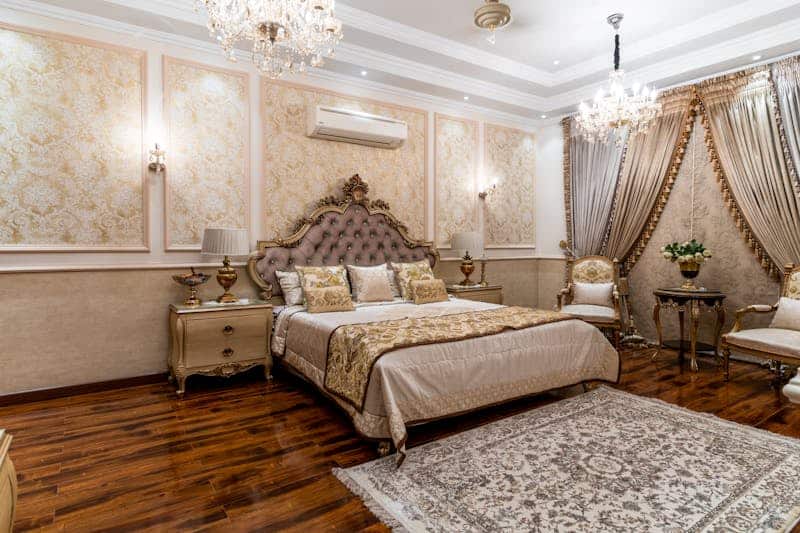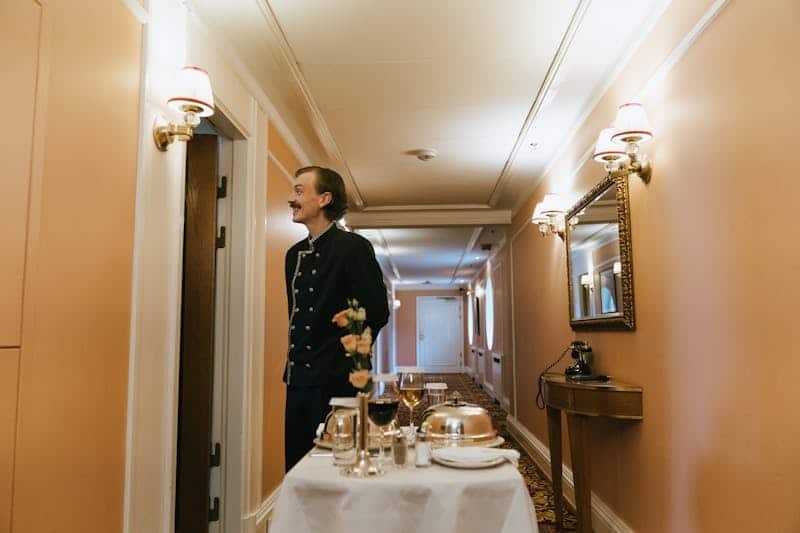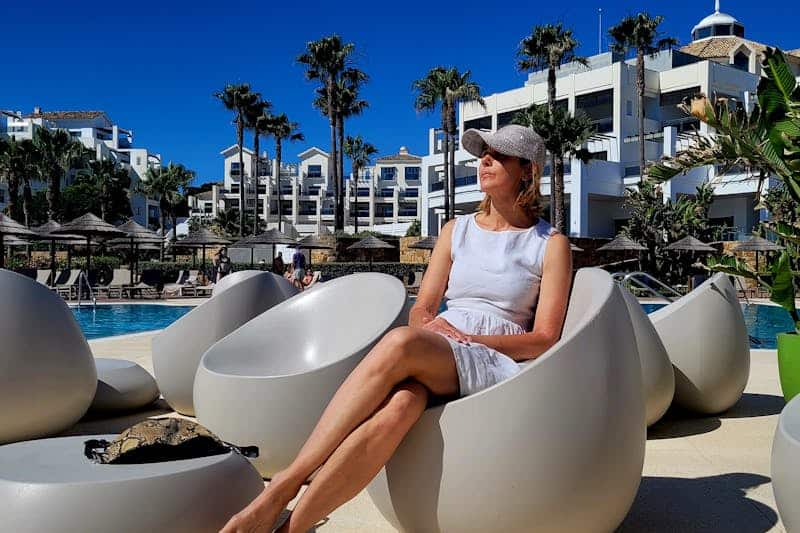
The articles on hotelchantelle.com are created with the assistance of AI technology. However, each article undergoes a thorough fact-checking and review process by our editorial team to ensure the accuracy and reliability of the information provided. We strive to deliver helpful and valuable content to our readers. Despite our best efforts, if you notice any errors or inaccuracies in our content, please reach out to us at [email protected], and we will promptly address the issue.
When traveling, finding a high-quality hotel is essential for an enjoyable trip. But what defines a truly good hotel? Certain features and characteristics set the top accommodations apart.
If you’re short on time, here’s a quick answer to your question: A good hotel provides clean, comfortable rooms; excellent customer service; convenient location; modern amenities; and value for the price.
Key aspects to describe include decor, bed comfort, hotel facilities, staff friendliness, surrounding area, and overall experience.
This in-depth guide will explore how to describe a good hotel in detail, covering the main factors that contribute to a positive hotel stay.
When describing a good hotel, one important aspect to consider is the decor and comfort of the rooms. The decor should be visually pleasing and create a welcoming atmosphere for guests.
This includes factors such as the quality of furniture, the color scheme, and the overall design aesthetic. A well-decorated room can make a guest feel relaxed and at home during their stay.
The comfort of the room is equally important. A good hotel should provide comfortable beds with high-quality mattresses and pillows. It’s important to note the cleanliness of the room as well, as this can greatly impact a guest’s comfort level.
A clean and well-maintained room shows that the hotel takes pride in its accommodations and cares about the satisfaction of its guests.

When evaluating the decor and comfort of a hotel room, it’s the little details that can make a big difference.
Look out for small touches that enhance the overall experience, such as thoughtful amenities like plush bathrobes and slippers, a well-stocked minibar, and complimentary toiletries. These small details can elevate a hotel room from good to great and leave a lasting impression on guests.
Additionally, the layout of the room should be functional and well-designed.
Are there enough outlets for charging devices? Is there ample storage space for luggage and personal belongings? These practical considerations can greatly enhance a guest’s experience and make their stay more convenient and comfortable.
When comparing hotels, it’s helpful to create a checklist of the decor and comfort features that are most important to you. This can help you make an informed decision and choose a hotel that aligns with your preferences.
Reading reviews and looking at photos online can also give you a better idea of how a hotel’s rooms are decorated and the level of comfort they provide.
Remember, the decor and comfort of a hotel room can greatly impact your overall experience as a guest.
By paying attention to these details and comparing different options, you can ensure that you choose a good hotel that meets your expectations and provides a comfortable and enjoyable stay.
When describing a good hotel, one of the most important aspects to consider is the quality of service and staff. A hotel can have all the amenities and luxurious facilities, but it is the service and staff that truly make a difference in the overall experience of the guests.
A good hotel will have a staff that is friendly, attentive, and knowledgeable. They should greet guests with a smile and go above and beyond to ensure their needs are met. Whether it’s providing recommendations for local attractions or resolving any issues that may arise, a hotel’s staff should always strive to deliver exceptional service.
One way to assess the quality of service is by looking at online reviews and ratings. Platforms like TripAdvisor and Booking.com provide valuable insights from previous guests, giving you an idea of what to expect in terms of service.
Positive reviews highlighting the professionalism and helpfulness of the hotel staff are usually a good sign.

A hallmark of a good hotel is the ability to provide personalized attention to its guests. This means going beyond the standard amenities and making each guest feel special and valued.
From remembering guests’ preferences to offering personalized recommendations, a hotel that goes the extra mile to create a unique experience stands out from the rest.
Some hotels even offer personalized welcome messages or surprise treats to make guests feel truly welcomed. These small gestures can make a big difference in creating a memorable stay for guests.
Another important factor in assessing the quality of service and staff is the level of training and professionalism.
A good hotel invests in training its staff to ensure they are equipped with the necessary skills and knowledge to provide excellent service. This includes training in customer service, communication, problem-solving, and conflict resolution.
Professionalism is also key. Staff should be well-groomed, punctual, and respectful towards guests. They should have a positive attitude and be able to handle any situation with grace and professionalism.
A hotel that prioritizes training and professionalism is more likely to deliver a high standard of service.
When describing a good hotel, it is essential to highlight the various amenities and facilities it offers. These features play a crucial role in enhancing the overall guest experience.
Here are some key amenities and facilities you can focus on:
A good hotel should provide comfortable accommodation options to its guests. This includes well-maintained rooms with clean and cozy beds, ample storage space, and a pleasant ambiance. Guests should feel relaxed and at ease during their stay.
Highlight the hotel’s dining options, such as a restaurant, café, or room service. Emphasize the quality and variety of food available, including both local and international cuisines. Mention any special dietary options or themed dining experiences that the hotel offers.
A great hotel should provide a range of recreational facilities to keep guests entertained. This may include a swimming pool, fitness center, spa, or sports facilities. Mention any unique features, such as a rooftop bar or a golf course, that set the hotel apart.

For travelers on business trips, it is crucial to highlight any business facilities the hotel offers. This may include meeting rooms, conference halls, and business center services. Mention any additional amenities, such as high-speed internet access or audiovisual equipment.
A good hotel should prioritize excellent customer service. Highlight the hotel staff’s friendliness, attentiveness, and willingness to go the extra mile to ensure guest satisfaction. Mention any special services offered, such as concierge assistance or 24/7 front desk support.
Don’t forget to mention any additional amenities that make the hotel stand out. This could include features like a spa, a rooftop terrace with a stunning view, a business lounge, or even a kids’ play area. These extra touches can greatly enhance the overall guest experience.
Remember to use descriptive language and provide specific examples to paint a vivid picture of the hotel’s amenities and facilities. By highlighting these aspects, you can effectively describe a good hotel and attract potential guests.
When describing a good hotel, it is important to assess the location and surrounding area. The location of a hotel plays a key role in determining its appeal to guests.
A hotel that is conveniently located near popular attractions, business centers, and transportation hubs is likely to be more desirable to travelers.
It is also important to consider the accessibility of the hotel and its proximity to amenities such as restaurants, shops, and entertainment venues.
Guests often appreciate hotels that are situated in beautiful and scenic areas. A hotel with a stunning view of the ocean, mountains, or city skyline can greatly enhance the overall guest experience. Additionally, hotels located in peaceful and tranquil settings can provide a relaxing and rejuvenating stay for guests.
When describing a hotel’s location and surrounding area, it is important to provide specific details and paint a vivid picture for potential guests. Highlight any unique or standout features of the location that make the hotel an attractive choice.
For example, if the hotel is located in a bustling city center, mention the nearby landmarks, shopping districts, and vibrant nightlife. On the other hand, if the hotel is nestled in a serene countryside, describe the picturesque landscapes, hiking trails, and opportunities for outdoor activities.
It can also be helpful to include any relevant statistics or rankings that showcase the appeal of the hotel’s location. For instance, if the hotel is located in a popular tourist destination, mention its high ratings on travel websites or its inclusion in “best of” lists.
Remember that guests often prioritize convenience, accessibility, and aesthetics when choosing a hotel. By providing a detailed and engaging description of the hotel’s location and surrounding area, you can help potential guests make an informed decision and create a positive impression of the property.

When describing a good hotel, it is important to consider both the value and overall experience it provides to its guests. Value refers to the quality and amenities offered in relation to the price paid, while the overall experience encompasses various factors that contribute to a memorable stay.
A good hotel should offer excellent value for money. This means that guests should feel that they are getting more than what they paid for.
This can include spacious and well-appointed rooms, modern facilities, complimentary services such as breakfast or Wi-Fi, and exceptional customer service. By providing these additional perks, hotels can elevate their value proposition and leave guests feeling satisfied.
The overall experience of a hotel is crucial in determining whether it can be considered as “good.” This includes factors such as cleanliness, comfort, ambiance, and the friendliness of the staff.
A good hotel should strive to create a welcoming and inviting atmosphere that makes guests feel at home. Additionally, attention to detail in terms of room amenities, decor, and the overall design of the hotel can greatly enhance the overall experience.
One way to gauge the overall experience of a hotel is by reading online reviews from previous guests. These reviews can provide valuable insights into the level of service, cleanliness, and overall satisfaction of past visitors.
Websites such as TripAdvisor or Booking.com are excellent resources for finding authentic and unbiased reviews from fellow travelers.
Another important aspect of the overall experience is the location of the hotel. A good hotel should ideally be situated in a convenient and desirable area, close to popular attractions, restaurants, and transportation options. This allows guests to easily explore the destination and enhances their overall experience.
Ultimately, describing a good hotel requires considering the value it offers in relation to the price paid, as well as the overall experience it provides to its guests. By focusing on these factors, you can paint a comprehensive picture of what makes a hotel truly exceptional.
When describing a good hotel, focus on factors like clean and comfortable rooms, friendly and prompt staff service, useful amenities, convenience of the locale, and value.
Go beyond just the room to discuss the overall environment and experience the hotel provides.
Attention to key details gives travelers a sense of what makes a hotel stand out.
Sara Thomas is the founder of HotelChantelle.com, a website dedicated to hotel safety products that travelers can use for added security and peace of mind.
After an unsettling hotel stay during a work trip, Sara realized a need for portable products that could secure hotel rooms. She launched HotelChantelle.com to provide devices like hidden camera detectors, portable door locks, and other discreet safety tools for travelers.
With a background in law enforcement, Sara understood the vulnerabilities of hotel rooms and wanted to empower travelers to protect themselves. She heads up a team that tests and reviews innovative security products for travelers to use in hotels globally.
Sara is committed to helping travelers feel relaxed and secure during hotel stays through access to protective gear they can easily take on any trip. The site covers products like personal safety alarms, RFID blocking gear to prevent digital pickpocketing, and items to safeguard personal data and belongings in lodging.
When she's not reviewing new products or running the site, Sara enjoys planning family vacations using the safety tools she sells on HotelChantelle.com. She lives with her husband and kids in Atlanta.